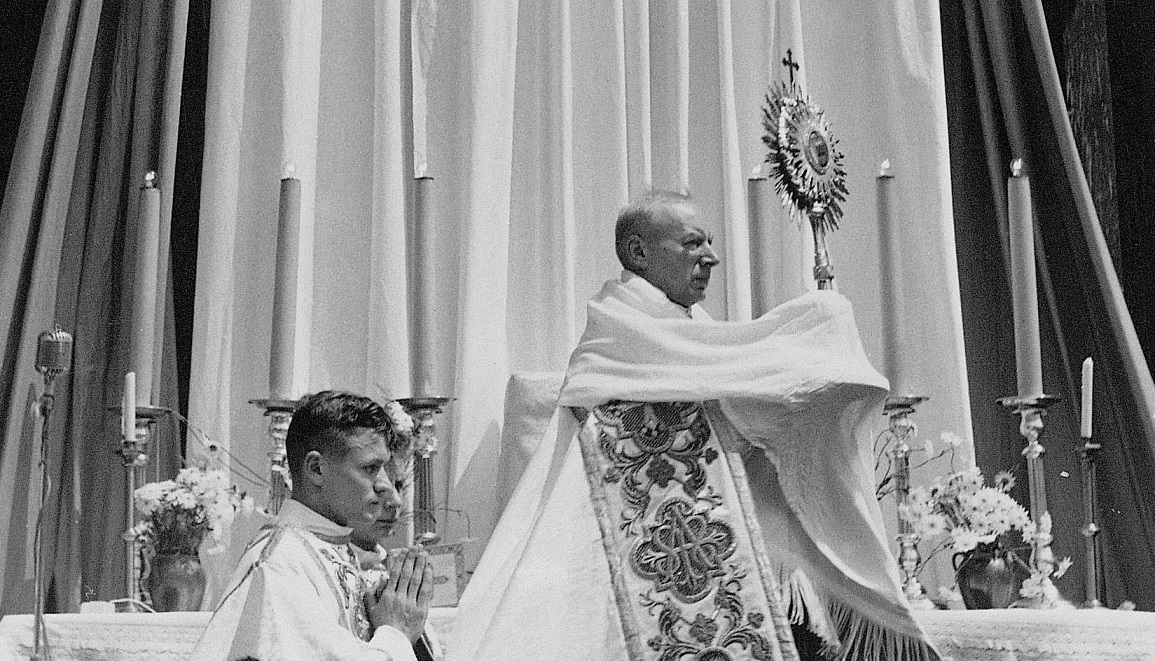Cardinal Wyszyński about the HOLY SACRAMENTS


photo: Primate Cardinal Stefan Wyszynski Institute
Pearls and Aphorisms of Blessed Cardinal Stefan Wyszyński about HOLY SACRAMENTS.
Baptism
- After baptism, a Christian does not differ externally from someone who has not been baptized. It is necessary to wait for the sacrament’s further efficacy, supported by Christian life, for the difference to emerge.[i]
- We are aware of our personal responsibility for the work of baptism through which we receive, for our spiritual life, the rich companionship of the Father, the Son, and the Holy Spirit. From now on, none of us is alone; each one is God’s dwelling place, a temple of the Spirit. God’s Spirit dwells in us and our bodies are consecrated to God. The Church constantly encourages us: Carry your God and glorify Him in your bodies.[ii]
- Baptism! The moment was extremely important for us because this is when our orphanhood, singularity, and isolation end. We are already in a community. The baby brought to be baptized is in a biological, natural community. And the infant who is baptized is already in another community, built on the natural order, but with supernatural powers – Gratia supponit naturam. It has been embraced in the community in the Holy Trinity.[iii]
The Confession of Sins
- Man is, by nature, directed by the truth, love, wisdom, and goodness that he has within himself towards the great Truth, Love, Wisdom, and Goodness. This orientation was shaken under the influence of the admitted thought that God wants to refuse us something, to skimp on something, to impoverish us, and to push us away from his inheritance. This is Satan’s trick. This is the source of man’s sin, misfortune, and fall.[iv]
- Our sin is felix culpa – You may ask: since a fault is a fault, why is it happy? It is happy because it teaches something, warns us against something, makes us cautious, makes us aware of God’s love that always overcomes human justice. Sin, not virtue, deserved such a Savior.[v]
- There is still hope for even the worst, for the downhearted, for those who have taken wrong paths, who have sanctified the most wicked means to accomplish their plan. God does not give up on them yet because redemption is integral and, therefore, even for the most wicked man, although we would have to forgive him for all his wickedness, not just seven times but seventy-seven times. Yet, these are God’s children! Even if they decked themselves with a mantle of judgments, (…) God has his “yes” for each of them – your sins are forgiven.[vi]
- We must try to acknowledge our sins and fervently ask God to forgive them. Every sin is against God’s love. For each one, one must ask God’s love for forgiveness and compensate the heavenly Father for our unfaithfulness to God’s supreme love.[vii]
- My brother! How many times have you experienced the “end of the world” in your personal life? How many times have death, doubt, weakness, mistrust looked into your eyes? It all pressed you down to the ground like a slate-grey wave. Yet, the Church passed next to you and kept saying to you: Trust, my son! Trust my daughter! No one has condemned you, and I will not condemn you; go in peace and sin no more.[viii]
- In the silence of our hearts, we think: You know me, you see me, you explore my whole interior, You judge me, Lord, You know, You know everything, You know that I love You …[ix]
The Eucharist
- The same power that operated at the Last Supper, today works on all the altars throughout the world. We do well to remember that, in the face of these miracles, the priest’s own strength means nothing. It is Christ who works through the hands and mouths of the priests.[x]
- Since the moment when the Word became flesh in the womb of the Virgin so that a man could be born into the world, God took such a delight in this way that He returns to dwell within people, like a grain of wheat, in every Holy Communion so that by this new incarnation each person may be born again from God.[xi]
- The eucharistic God is constantly looking for his Bethlehem, his manger. Often there is no place for him in the inn, but in whoever receives him, the stable becomes a temple, and man is deified.[xii]
Previous Pearls and Aphorisms:
SOCIAL THOUGHT of the Church >>>
PRAYERS AND PRISON MEDITATIONS >>>
[i] List II, 112.
[ii] Te Deum of the Millennium of Academic Youth. Jasna Góra, 15 May 1966. KP 23, 392. Głos, 205.
[iii] Ibid., 65.
[iv] Miłość I, 35.
[v] Blessed Are the Merciful. Warszawa-Choszczówka, 31 August 1972. Love, 79.
[vi] Christ’s Saving Program – on the Cross of Mankind. Warsaw, chapel in the Primate’s house, 18 February 1979. KP 62, 89.
[vii] A call to prepare the hearts For the Resurrection of the Lord. Popielec 1961. Listy, 376.
[viii] The Church and a Nation of Heroic Hope and Life. Gorzów Wielkopolski, 1 December 1957. Wielka, 183.
[ix] Lenten call For the Jubilee Holy Year. Gniezno, 2 February 1974. Listy, 677.
[x] List II, 116.
[xi] Stoczek Warmiński, 4 June 1954. Zapiski, 75.
[xii] Stoczek Warmiński, 4 June 1954.





Dodaj komentarz